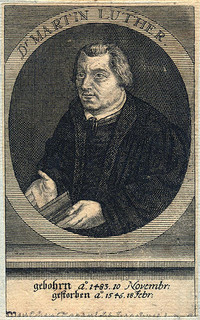Martin Luther and the Original Languages
Martin Luther is well known for his role in starting the Reformation. It has always been of particular interest to me how Luther viewed the importance of Greek and Hebrew in his daily ministry. Since I teach language courses in a seminary setting, I’m always looking for good quotes to motivate the students to put in the effort and learn the languages. A couple quotes from Luther are especially worth sharing.
If the languages had not made me positive as to the true meaning of the Word, I might have still remained a chained monk, engaged in quietly preaching Romish errors in the obscurity of a cloister; the pope, the sophists, and their anti-Christian empire would have remained unshaken.
W. Carlos Martyn, The Life and Times of Martin Luther (New York: American Tract Society), 474.
I know full well that while it is the Spirit alone who accomplishes everything, I would surely have never flushed a covey if the languages had not helped me and given me a sure and certain knowledge of Scripture. I too could have lived uprightly and preached the truth in seclusion; but then I should have left undisturbed the pope, the sophists, and the whole anti-Christian regime.
Martin Luther, “To the Councilmen of All Cities in Germany That They Establish and Maintain Christian Schools,” in The Christian in Society II, ed. Walther I. Brandt, trans. Albert T. W. Steinhaeuser and rev. Walther I. Brandt; Luther’s Works 45; Philadelphia: Muhlenberg, 1962), 366.
Both of the above quotes demonstrate that Luther directly attributed the confidence and boldness with which he fought against the Catholic Church to a clear understanding of Scripture brought through the original languages. In addition, Luther was convinced that without the languages the gospel itself would be lost due to lack of clarity!
And let us be sure of this we will not long preserve the gospel without the languages. The languages are the sheath in which this sword of the Spirit is contained; they are the casket in which this jewel is enshrined; they are the vessel in which this wine is held; they are the larder in which this food is stored; and, as the gospel itself points out, they are the baskets in which are kept these loaves and fishes and fragments. …
For this reason even the apostles themselves considered it necessary to set down the New Testament and hold it fast in the Greek language, doubtless in order to preserve it for us there safe and sound as in a sacred ark. For they foresaw all that was to come, and now has come to pass; they knew that if it was left exclusively to men’s memory, wild and fearful disorder and confusion and a host of varied interpretations, fancies, and doctrines would arise in the Christian church, and that this could not be prevented and the simple folk protected unless the New Testament were set down with certainty in written language. Hence, it is inevitable that unless the languages remain, the gospel must finally perish.
MARTIN LUTHER, “TO THE COUNCILMEN OF ALL CITIES IN GERMANY THAT THEY ESTABLISH AND MAINTAIN CHRISTIAN SCHOOLS,” 360.
Luther never believed everyone could or should learn Greek and Hebrew. After, Luther even translated the Bible into German so that the common people could have God’s Word in an understandable form. So clearly he was not a language “snob.” However, he recognized the beauty and importance of the original languages. Since Scripture is God’s Word, it behooves believers to understand it as best they can, and that would include (when possible) attaining the ability to read it in the original languages. In closing, note how applicable Luther’s comments are to today’s opportunities.
Since it becomes Christians then to make good use of the Holy Scriptures as their one and only book and it is a sin and a shame not to know our own book or to understand the speech and words of our God, it is a still greater sin and loss that we do not study languages, especially in these days when God is offering and giving us men and books and every facility and inducement to this study, and desires his Bible to be an open book. O how happy the dear fathers would have been if they had had our opportunity to study the languages and come thus prepared to the Holy Scriptures! What great toil and effort it cost them to gather up a few crumbs, while we with half the labor–yes, almost without any labor at all–can acquire the whole loaf! O how their effort puts our indolence to shame! Yes, how sternly God will judge our lethargy and ingratitude!
MARTIN LUTHER, “TO THE COUNCILMEN OF ALL CITIES IN GERMANY THAT THEY ESTABLISH AND MAINTAIN CHRISTIAN SCHOOLS,” 364.
